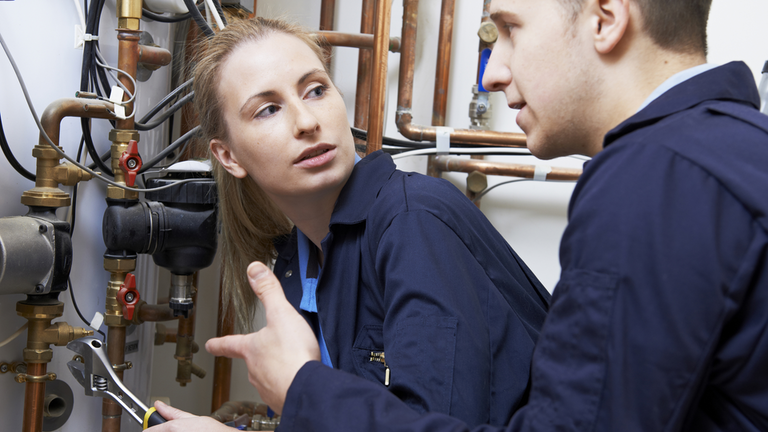
Plumbing is not what it used to be, and it can be a very lucrative business if handled properly. The key for success is to know how to find leads while providing quality work. Regarding leads, managing your online presence is definitely a crucial part in becoming a leading brand.
A water leak, blocked toilets, a radiator that no longer works by – 3 ° outside … a hard blow that can happen to anyone, at any time and deprive us of our modern comfort! If the plumber is the professional to contact in these cases, his mission is not limited to troubleshooting. Indeed, its role is also to provide drinking water, heating and air conditioning in offices, buildings and public places.
The job of a plumber
A specialist in sanitary installations, the plumber works in an industrial environment as well as in individual houses or collective establishments, whether for renovation work on old buildings or installations in new constructions.
The plumber assembles, repairs and maintains the water and gas pipes upstream and downstream of the devices themselves. It also carries out the installation and repair of sanitary appliances: bathtub, water heater, meter, taps.
Business description
Today, the plumber is not only the professional who is urgently called to repair a water leak. He also works on many other types of sites: installation of sanitary equipment, installation of swimming pool and spa, installation of heating system … Water, gas, the plumber masters all these installations! The plumber or plumber works according to the plans provided to him.
Its missions consist of:
- Installing the pipes (water, gas, fuel, wood, solar energy). To do this, he studies the distribution and location of devices from the architect’s plans. It traces the course of the pipes along the walls and floors. He drills the necessary holes for laying pipes, shapes the piping by cutting tubes to the necessary dimensions and assembles them.
- Checking for leaks and insulation once the pipes are installed.
- Installing sanitary ware and make electrical connections for those who need it: bathtub, water heater, meter, taps, sink, radiators, boilers, etc.
- Ensuring the adjustment and maintenance of all these devices.
- Carrying out repairs: water leaks, disgorging pipes, unblocking septic tanks, troubleshooting a water heater, a boiler, repairing faucets, replacing defective devices
Often the plumbing contractor has a dual skill: plumber-heating engineer, plumber-thermal installer (he then takes care of the installation and maintenance of boilers and, increasingly, solar panels) or even plumber-roofer-zinc worker (for the installation of gutters, downspouts and generally to participate in the waterproofing of roofs). After a few years of practice, the plumber can progress to a position of site manager or work supervisor. He can also set up on his own, as a craftsman installer or repairman.
He traces the route of the pipes along the walls and partitions. He shapes the piping by cutting tubes to the desired dimensions. It welds them together or connects them to a heater or sanitary equipment, for example. He checks that the system is working properly and that there are no leaks. He installs plumbing fixtures, radiators and boilers in the places best suited to their use. It ensures the adjustment and maintenance of all these installations. He also performs many repairs and repairs to the homes of individuals.
The plumber most often works on a construction site, sheltered from the elements. Depending on the importance of the work, he works alone or in a team. The plumber’s job requires good physical condition because the plumber often operates in uncomfortable postures and sometimes carries and handles heavy loads. He may be required to work on Saturdays and on certain public holidays, often in an emergency, which therefore requires some availability.
Required qualities of a plumber
- Precision and manual skill: The plumber is required to handle machines and assemble fragile materials. To carry out work on delicate parts, he must therefore be meticulous, careful and have good manual dexterity.
- Availability: Often called upon for emergency repairs, the plumber can be called anytime. He must therefore be flexible in his schedules and availability (evening, weekend, public holiday).
- Relational sense: If he works alone for an individual, the plumber must be able to explain his interventions and advise his client. If he is on a construction site, he collaborates with other colleagues (other pipefitters, electricians, masons etc.). In all cases, he must be able to communicate with ease.
- Autonomy and sense of initiative: Each installation is different and the breakdowns are just as varied and sometimes even unprecedented. The plumber must therefore show adaptability, initiative and resourcefulness to assess the importance of the work to be undertaken, to choose the best repair technique, sometimes in an emergency.
- Good form and physical resistance: If he works most often indoors and therefore does not suffer from inclement weather like other construction professionals, the plumber must nevertheless adopt uncomfortable working positions and for example twist to repair pipes which are difficult to access. He is also required to transport heavy parts such as boilers.
The plumber works as an employee in a sanitary or building plumbing company or in a company offering various specialties: roofing, thermal, zinc, sanitary, climatic … The driver’s license is essential to travel on the roads or construction sites. He can work on his own as a craftsman-installer or repairman before starting his own business.
Plumbing is one of the most popular specialties in the building industry. There are over 115,000 plumbing companies in the United States. And it can be very profitable if implemented in conjunction with a good marketing strategy.

